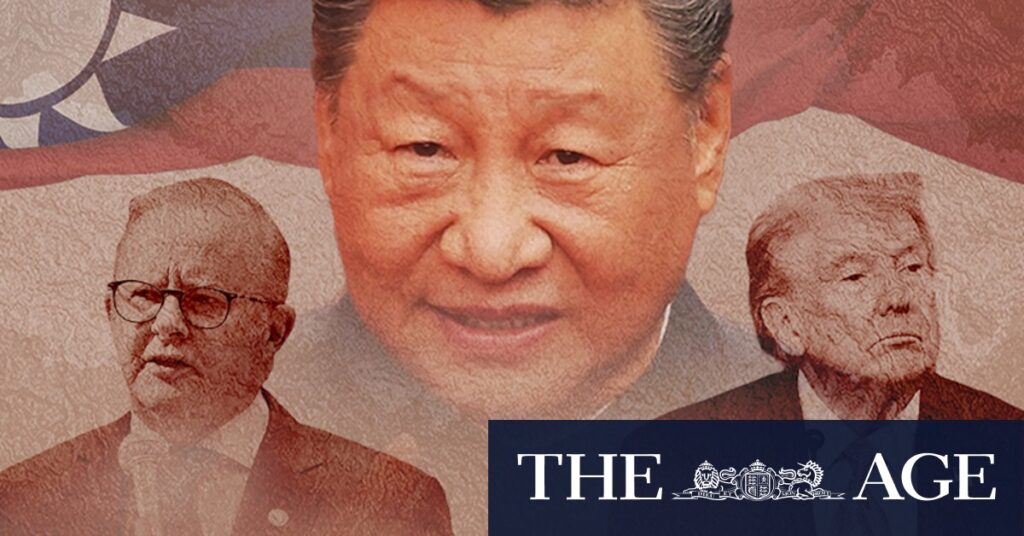
As former President Donald Trump and Australian Prime Minister Anthony Albanese fielded questions from reporters in the White House cabinet room during their first meeting on Tuesday morning, the specter of another world leader loomed large. Chinese President Xi Jinping, though absent, was a central figure in the discussions.
Trump’s enthusiastic remarks about the AUKUS nuclear-powered submarine pact and his awkward interaction with Kevin Rudd captured Australian media attention. However, it was his comments on Xi Jinping and the self-governing island of Taiwan that resonated globally. When asked if AUKUS was meant to deter China, Trump affirmed, “Yes.”
This candid response, typical of Trump’s style, underscored the growing military power of China as a key factor in Australia’s pursuit of advanced military technology. Yet, leaders have typically avoided such direct public statements. Trump quickly assured that he was unconcerned about a conflict with Xi, asserting, “I think we’ll be just fine with China. China doesn’t want to do that.”
Trump’s Foreign Policy Focus Shifts
The comments come at a pivotal moment. As Trump met with Albanese, he was already contemplating a meeting with Xi. “I think we’re going to get along very well,” he remarked about his Chinese counterpart. Trump’s first nine months back in office have been dominated by European and Middle Eastern affairs, but his focus is now shifting to the Asia-Pacific region.
Next week, Trump is set to travel to Kuala Lumpur for the ASEAN meeting, followed by a visit to Tokyo to meet Japan’s new Prime Minister Sanae Takaichi, and then to the APEC summit in South Korea. While in Gyeongju, southeast of Seoul, Trump and Xi are scheduled for their first meeting since Trump’s return to power. Although there is a possibility of cancellation, Trump expressed confidence that it would proceed.
Australia’s Delicate Balancing Act
For Australia, balancing economic ties with China and security alliances with the US presents significant challenges. Albanese has stabilized relations with Beijing, lifted trade barriers, and taken steps to prevent Chinese dominance in the Pacific, including a defense treaty with Papua New Guinea. A recent incident involving a Chinese military aircraft and an Australian air force plane over the South China Sea highlighted the risks of escalation.
Australian officials are wary of the US provoking China, yet they also caution against Washington becoming complacent about Xi’s strategic ambitions. Trump, known for his bold promises, told reporters, “We’ll make a deal on, I think, everything,” including soybeans and potentially nuclear issues.
The Taiwan Conundrum
Trade is likely to be a top priority for Trump, but Taiwan remains a contentious issue. Supporters fear Trump might trade away support for Taiwan in exchange for a trade deal with Xi. The upcoming Trump-Xi meeting will test this theory. The outcome will depend on ongoing trade talks between US and Chinese negotiators, led by US Treasury Secretary Scott Bessent and Chinese Vice Premier He Lifeng.
Defense expert Sam Roggeveen expressed concern over Trump’s nonchalant approach to Taiwan. US officials believe Xi has instructed the Chinese military to be capable of winning a war over Taiwan by 2027, though there is no set deadline. In September, Xi showcased China’s military capabilities, including advanced missiles, at a parade in Beijing.
“Miscalculation is a danger on both sides,” says Roggeveen, the Lowy Institute’s program director for international security. “The US still has the most powerful military on paper, but that is not terribly relevant to a Taiwan scenario.”
Naval expert Jennifer Parker believes Trump’s comments on Taiwan reflect his characteristic bravado. “It’s the type of bravado you expect from Trump,” she says, noting that those around Trump are less relaxed about potential conflict.
Strategic Moves and Global Trade
Under Trump, the US has deepened military cooperation with Taiwan, continuing a program approved under the Biden administration. However, Trump’s interest in Taiwan’s democracy has been questioned. Former national security advisor John Bolton noted Trump’s skepticism about Taiwan’s military support in his memoirs.
China-Taiwan experts Marvin Park and David Sacks suggest Xi might use his meeting with Trump to request reduced US support for Taiwan. They warn that accepting such a deal would be a “grave mistake” for the US.
Meanwhile, economic tensions are high. Bessent criticized China’s trade policies, particularly its control over rare earths, essential for high-tech products. Beijing recently announced new export controls on rare earths, escalating tensions.
“If China wants to be an unreliable partner to the world, then the world will have to decouple,” Bessent stated. “The world does not want to decouple. We want to de-risk.”
In response, Albanese secured a rare earths deal with the US, aimed at reducing China’s monopoly. This move, while preliminary, strengthens the US position in upcoming talks with China.
As Trump and Xi prepare for their meeting, the stakes are high. The potential for a substantive deal remains uncertain, with both sides entrenched in their positions. The outcome will have significant implications for global trade, the Indo-Pacific power balance, and the future of Taiwan.
“There’s no grand bargain to be had at APEC,” says the Lowy Institute’s Richard McGregor. “This is a generational struggle. It’s not going to be settled by one meeting at one event.”






